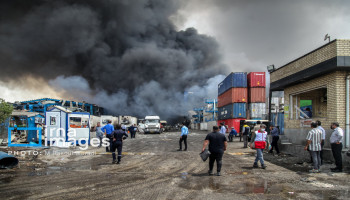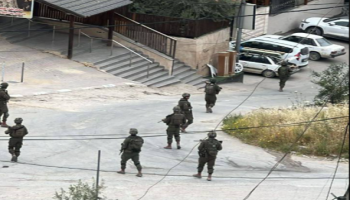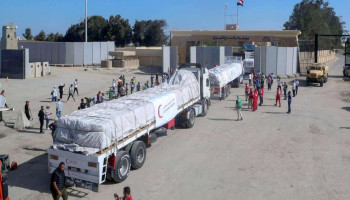The Yemeni Armed Forces announced on Saturday the execution of two significant military operations in collaboration with the Islamic Resistance in Iraq, targeting five ships at the port of Haifa and in the Mediterranean Sea. These actions were part of a broader campaign in response to the injustices against the Palestinian people and the atrocities committed against our brothers in the Gaza Strip.
In a detailed statement, the Yemeni Armed Forces revealed that the first operation successfully targeted four ships in the port of Haifa using drones. The targeted vessels included two cement carriers and two general cargo ships belonging to companies that allegedly violated the prohibition on entering ports in occupied Palestine. The second operation focused on the vessel "Shorthorn Express" in the Mediterranean Sea, also achieved with drone strikes, on its route to the port of Haifa.
According to the Yemeni Armed Forces, both operations were declared successful with precise and direct hits, who credited their success to divine assistance. The Yemeni forces reaffirmed their commitment to continuing joint military operations with the Islamic Resistance in Iraq until the blockade and aggression against the Palestinian people in Gaza is lifted.
Furthermore, the Yemeni Armed Forces reported a missile strike targeting the American aircraft carrier "USS Dwight D. Eisenhower" in the northern Red Sea. This operation involved several ballistic and cruise missiles that successfully achieved its objectives. Another noteworthy operation by the Yemeni naval forces targeted the vessel "Transworld Navigator" in the Arabian Sea using ballistic missiles, resulting in direct hits, justified by the vessel's violation of the entry ban into occupied Palestinian ports.
U.S. Central Command and European Naval Forces Responses
In response to these developments, the U.S. Central Command announced that the "USS Dwight D. Eisenhower" was returning to the United States and would be replaced by the "USS Theodore Roosevelt" after its mission in the Pacific. Reports from the U.S. Naval Institute (USNI) indicated that the "Eisenhower" was preparing to leave the Red Sea, with the "Roosevelt" expected to take over its role in the Middle East.
Fox News reported that the "Eisenhower" and its crew have been facing fatigue after enduring what was described as the most intense naval battle since World War II over the past nine months. Yemeni Deputy Foreign Minister Hussein al-Ezzi commented on the withdrawal of the "Eisenhower," seeing it as a positive indicator and expressing doubts about the success of its replacement, the "Roosevelt."
Rear Admiral Vasileios Gryparis, Commander of the European Naval Force in the Red Sea, emphasized the need to double the European Union’s naval presence in the area due to the escalating attacks by Yemeni forces.
Escalation of Military Operations
The Yemeni Armed Forces have conducted numerous operations throughout June, targeting various ships in the Red Sea and the Arabian Sea. Notably, on June 16, a U.S. destroyer and the vessel "Captain Paris" were targeted with ballistic and appropriate naval missiles, respectively. Additionally, the forces carried out drone strikes against the vessel "Happy Condor" in the Arabian Sea.
Earlier in June, the Yemeni forces executed joint operations with the Islamic Resistance in Iraq, targeting strategic sites in the cities of Ashdod and Haifa and multiple vessels violating the entry ban to occupied Palestinian ports.
Continued Resistance and Military Strikes
The Yemeni Armed Forces' operations underscore a sustained and escalating military campaign against vessels associated with countries or companies violating the entry ban to occupied Palestinian ports. This campaign has made notable incidents such as targeting the British warship "HMS Diamond" and various commercial vessels in the Red and Arabian Seas.
Yemeni forces have also introduced a new ballistic missile named "Palestine," which was used to target a military site in occupied Palestine, further indicating their ongoing commitment to military action in support of the Palestinian cause.







